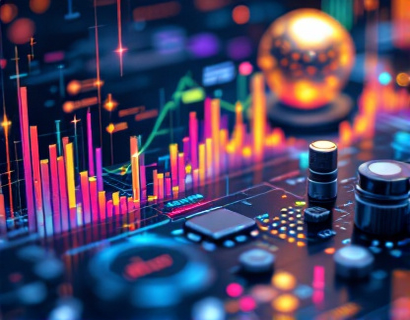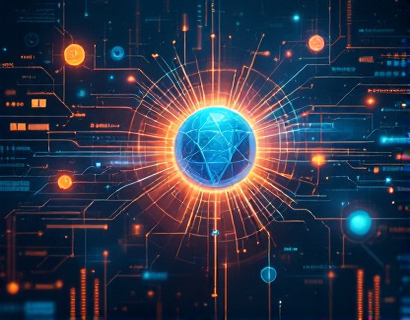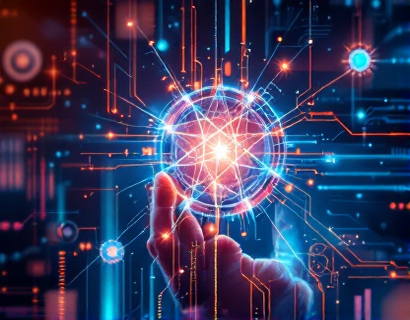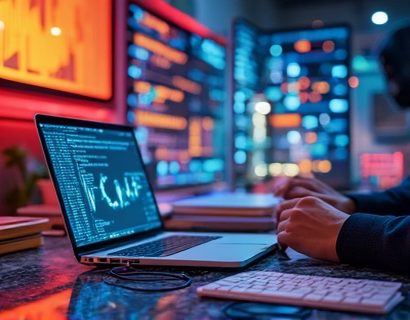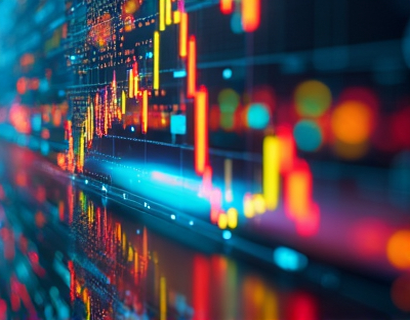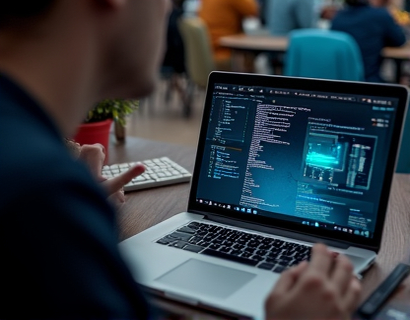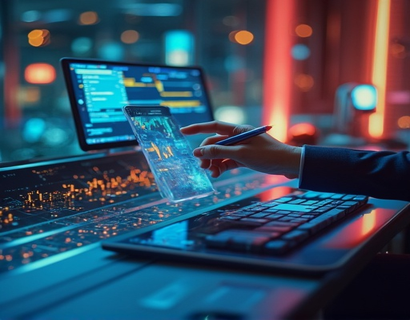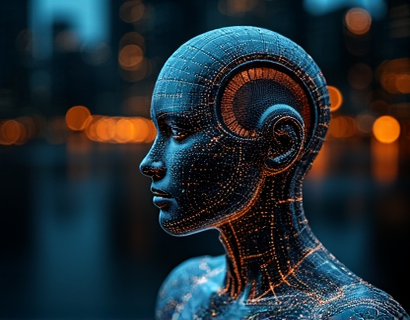Crypto and AI: Pioneering Enhanced Digital Experiences in the Modern Ecosystem
The intersection of cryptocurrency and artificial intelligence (AI) is revolutionizing the digital landscape, creating unprecedented opportunities for growth, connectivity, and innovation. This merging of technologies is not just a trend but a fundamental shift in how we interact with digital platforms and services. As we delve into this transformative space, it's essential to understand the key drivers, current applications, and future potential of this synergy.
Understanding the Synergy: Crypto and AI
Cryptocurrency, built on blockchain technology, offers a decentralized and secure way to conduct transactions without intermediaries. AI, on the other hand, leverages machine learning and data analysis to simulate human intelligence, enabling systems to learn from experience and improve over time. When combined, these technologies can create more secure, efficient, and intelligent digital experiences.
The integration of AI in cryptocurrency ecosystems enhances various aspects, from transaction processing and security to user experience and market analysis. AI algorithms can analyze vast amounts of data to predict market trends, optimize trading strategies, and detect fraudulent activities with high accuracy. This synergy not only boosts the reliability and efficiency of crypto platforms but also opens new avenues for innovation and user engagement.
Enhanced Security through AI
One of the most significant benefits of merging crypto and AI is the enhancement of security measures. Traditional cybersecurity methods often struggle to keep pace with sophisticated cyber threats. AI-driven security solutions, however, can adapt and respond to new threats in real-time, providing a more robust defense mechanism.
For instance, AI can monitor blockchain networks for unusual patterns or anomalies that may indicate a security breach. Machine learning models can be trained to recognize and flag suspicious activities, such as unusual transaction volumes or patterns that deviate from the norm. This proactive approach to security helps protect user assets and maintains the integrity of the crypto ecosystem.
Moreover, AI can improve the authentication and identity verification processes. Biometric data, such as facial recognition or fingerprint scans, can be integrated with blockchain to create secure and seamless identity verification systems. This not only enhances user security but also simplifies the onboarding process for new users.
Optimized User Experiences
The integration of AI in crypto platforms significantly enhances user experiences. Personalization is a key area where AI shines. By analyzing user behavior and preferences, AI can tailor the user interface and experience to individual needs. For example, a crypto trading platform can use AI to recommend assets based on a user's trading history and risk tolerance, providing a more personalized and efficient trading experience.
Chatbots powered by AI can also play a crucial role in customer support. These intelligent assistants can handle a wide range of queries, from account management to transaction issues, providing instant and accurate responses. This not only improves user satisfaction but also reduces the workload on human support teams, allowing them to focus on more complex tasks.
Furthermore, AI can optimize the user interface by dynamically adjusting the layout and content based on user interactions. For instance, frequently used features can be made more accessible, while less used options can be minimized or hidden. This adaptive interface design ensures that users can navigate the platform more efficiently, enhancing overall user satisfaction.
Smart Contracts and AI: A Powerful Combination
Smart contracts, self-executing contracts with the terms directly written into code, are a cornerstone of blockchain technology. When combined with AI, smart contracts can become even more powerful and versatile. AI can be used to analyze complex scenarios and automate decision-making processes within smart contracts, making them more intelligent and responsive.
For example, in decentralized finance (DeFi) applications, AI can enhance risk management by dynamically adjusting the parameters of smart contracts based on real-time market conditions. This can help mitigate risks and ensure that transactions are executed under optimal conditions. Additionally, AI can help in the creation of more sophisticated and automated financial instruments, such as AI-driven derivatives and insurance products, further expanding the capabilities of the crypto ecosystem.
Market Analysis and Trading Insights
AI-driven market analysis is another critical area where the fusion of crypto and AI is making a significant impact. Traditional market analysis relies heavily on human interpretation and can be limited by biases and the sheer volume of data. AI, however, can process and analyze vast datasets in real-time, providing insights that are both accurate and timely.
Trading algorithms powered by AI can identify patterns and trends that may not be visible to human analysts. These algorithms can execute trades at optimal times, maximizing returns and minimizing risks. Moreover, AI can provide predictive analytics, forecasting market movements based on historical data and current trends. This enables traders to make more informed decisions and stay ahead of the market.
For crypto investors, AI-driven tools can offer comprehensive analysis of multiple assets simultaneously, helping them diversify their portfolios and manage risk more effectively. These tools can also monitor news and social media feeds to gauge market sentiment, providing additional layers of insight for investment strategies.
Decentralized Applications and AI
Decentralized applications (dApps) are at the forefront of the crypto revolution, offering decentralized alternatives to traditional centralized services. The integration of AI into dApps can further enhance their functionality and user experience. For instance, AI can be used to create more intelligent and responsive user interfaces, personalized recommendations, and automated processes within these applications.
One notable example is AI-powered decentralized lending platforms. These platforms use AI to assess creditworthiness and determine loan terms, making the lending process more efficient and accessible. AI can also help in fraud detection and risk management, ensuring that transactions are secure and trustworthy.
Another area is decentralized gaming, where AI can create more realistic and engaging game environments. AI-driven non-playable characters (NPCs) can provide a more immersive experience, while AI can also be used to balance game difficulty and adapt to player skills, ensuring a fair and enjoyable gaming experience.
Challenges and Considerations
While the integration of AI and crypto offers numerous benefits, it also comes with its own set of challenges. One of the primary concerns is the regulatory landscape. The crypto space is still largely unregulated, and the addition of AI introduces new complexities. Regulators are beginning to take notice, and there is a growing need for clear guidelines and frameworks to ensure that these technologies are used responsibly and ethically.
Another challenge is the technical complexity involved in integrating AI with blockchain systems. Developing robust and scalable solutions requires expertise in both domains, which can be a barrier for many projects. Additionally, the computational resources required for AI processes can be substantial, potentially leading to higher transaction costs and energy consumption.
Privacy is also a critical consideration. While AI can enhance security, it can also raise concerns about data privacy. Ensuring that user data is handled transparently and securely is essential to maintaining trust in the ecosystem. Implementing privacy-preserving techniques, such as zero-knowledge proofs, can help address these concerns while leveraging the benefits of AI.
Future Prospects
The future of the crypto and AI convergence is promising, with numerous potential developments on the horizon. As technology advances, we can expect to see more sophisticated AI models that can operate more efficiently on blockchain networks. The development of specialized hardware, such as AI accelerators for blockchain, could significantly reduce computational costs and improve performance.
Interoperability between different blockchain platforms and AI systems will also become more seamless, enabling a more integrated and cohesive ecosystem. This could lead to the creation of universal AI-powered crypto tools that can be used across various platforms, enhancing user convenience and adoption.
Moreover, the integration of AI with other emerging technologies, such as the Internet of Things (IoT) and 5G, will further expand the possibilities. For instance, AI can optimize the use of IoT devices in a decentralized manner, while 5G can provide the necessary bandwidth for real-time AI-driven crypto applications.
In conclusion, the merging of cryptocurrency and AI is not just a technological advancement but a transformative force that is reshaping the digital ecosystem. By enhancing security, personalizing user experiences, and enabling intelligent decision-making, this synergy is paving the way for a more secure, efficient, and user-friendly digital future. As the technology continues to evolve, the potential for innovation and growth remains vast, making it an exciting area to watch and participate in.




